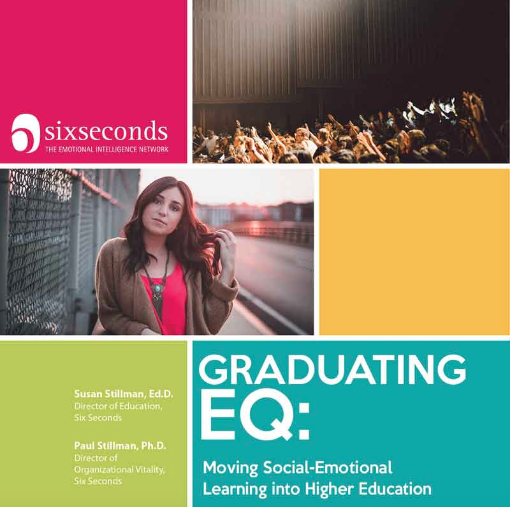How do we bridge the gap between childhood and the workforce? What exists between those worlds? Higher Education needs emotional intelligence like all school settings. So how does EQ fit into the Higher Ed?
EQ in schools has measurable success. There is a large and growing body of research that shows that understanding and being sensitive to emotions leads to healthier relationships, greater self-awareness, and other essential traits that make for successful adults. It has also become clear that EQ is important in the working world. Companies are now increasingly interested in hiring employees with high EQ as they tend to be more productive, better at handling pressure, and working well with others.
Recently educators, administrators, students & researchers from 89 countries joined in the first ever virtual conference on emotional intelligence in higher education called EQ.EDU: Moving SEL into Higher Ed. Here’s what participants learned about the value of EQ beyond the k-12 educational setting.
Today, many university students are facing challenges that they are emotionally unfit to handle. Students often leave university due to dejection, disillusionment, or apathy as opposed to low ability. Drop-out rates are exceptionally high and though more than 2 million students begin college in the US each year, only about half will leave with a diploma. Now more than ever it is essential that students possess the proper emotional skills that will allow them to succeed in school.
College can be a demanding place for students and faculty alike. Feelings of isolation and a lack of community are not uncommon and these issues are becoming more present with the expansion of online learning.
What if we could use EQ to create an environment of collaboration and empathy within higher education?
In the first EQ in Higher Education virtual conference, EQ.EDU Moving SEL into Higher ED organized by Six Seconds Director of Education, Dr. Susan Stillman and Assistant Director of Education, Cherilyn Leet, experts in higher education gathered to offer their expertise on increasing connection and building communities in the higher education landscape.
What role does EQ play in higher education?
- Social-emotional learning can promote engaged communities in higher education
- EQ can lessen the impact of the challenges that students and faculty face on campus
- We use emotional intelligence to foster trusting, engaged, supportive groups among students, faculty & staff, and virtual teams


Many students who enter higher education end up leaving without a degree, or if they stay, they fail to succeed.
While some may lack the critical thinking and study skills necessary to academically flourish, many others are emotionally ill-equipped and do not possess the grit needed to thrive. According to a study conducted by Harris Poll for The JED Foundation, Partnership for Drug-Free Kids, and The Jordan Porco Foundation 60 percent of college students said they wished they had “more help getting emotionally ready for college.”
Emotional preparedness was a major factor in determining whether a student had a successful freshman year or not.
According to Dr. Sue McNamara, Six Seconds’ Regional Network Director and Adjunct Professor and Programme Lead of Soft Skills with the Institute for Engineering Leaders at the National University of Singapore, universities should begin with the end in mind. What will success at their institution look like and what will it require? EQ is an essential factor in developing the social and academic skills needed for success in higher education and Dr. Sue McNamara notes that the implementation of EQ in higher education results in less conflict, better decisions, deeper relationships, and more collaboration.
According to the student panel present at EQ.EDU Moving SEL into Higher ED, EQ skills, such as the ability to sit with new and uncomfortable ideas, are vital for developing a global mindset and for collaborating with diverse peers.
While EQ skills help students learn teamwork and leadership abilities, it is also important for faculty and staff to be involved. Faculty should guide students in the process of re-defining education with the inclusion of EQ development, and universities should work on creating spaces for students to “feel” a part of the community.
How can EQ competencies help educators themselves?

Many educational leaders around the world believe that EQ skills are critical for helping college and graduate students, young and old, to succeed. But can these skills can be just as beneficial for educators?
Developing EQ competencies can help faculty become more effective leaders, teachers, and colleagues and can help fight stressors such as disengagement, burnout, and challenging student issues.
According to the faculty panel present, university leadership should promote events and create opportunities for faculty to deepen their EQ. Navigating the field of higher education is challenging and the cultural competence of the faculty is critical for the community’s success.

Dr. Jensen, an EQ Pioneer, President of Six Seconds, and Professor at Notre Dame de Namur University, believes that emotional intelligence can deepen a university’s community. The current and future success of any college campus centers on the strengths of its people and communities – and what better a way to grow those strengths than with EQ?
When colleges develop their community’s emotional intelligence, diversity, equity, and inclusion prosper – critical values for any college committed to social justice.
Dr. Jensen believes that every interaction leaves an exchange of emotions and that emotions are more contagious than the common cold, which begs the question: What trace emotion will you leave in your interactions with students and colleagues?
What’s new in emotional intelligence?
Four Tips to Make A Culture of Learning from Mistakes: EQ Educator News
How emotional intelligence can help you learn from mistakes and make them a vital part of learning? Keep reading for EQ research and resources you can use for you, your faculty and students.
Emotional Intelligence to Reduce Teacher Burnout: EQ Education News
Is it burnout season? Teachers and parents everywhere are ready for a break. There’s never been a better time to practice emotional intelligence. In this month’s newsletter we explore how emotional intelligence can help with educator burnout. Keep reading for EQ research and resources you can use for you, your faculty and students.
Elmo Said WHAT? Research & Tips for Emotions for Wellbeing – EQ Education
When Elmo asked, LOTS of people answered. Checking in on emotions is a great step, but not enough for lasting wellbeing. Let’s put EQ into action this month!
EQ Education News: Am I Doing This All Wrong? 5 Tips for Parenting Shy Kids
Emotional intelligence skills are learnable at any age. In this month’s newsletter we explore the emotion Shy among children
What Makes Us Seek Connection? EQ Educator News
Experiencing a sense of belonging is a driver for our wellbeing. Research and tips to build connection and community.
EQ Educator News: Where Have All the Students Gone?
Why has school attendance plummeted? In this month’s newsletter, we explore the research and offer evidence-based solutions for educators.
- Enhance Emotional Literacy - July 13, 2023
- Plutchik’s Wheel of Emotions: Feelings Wheel - March 13, 2022
- Technology Loneliness: EQ Tips from Daniel Goleman - October 24, 2020









